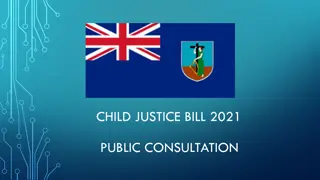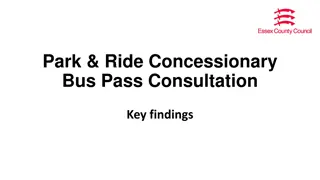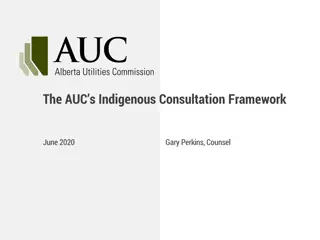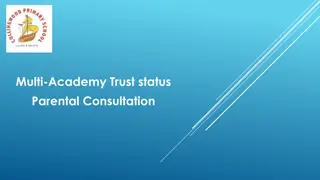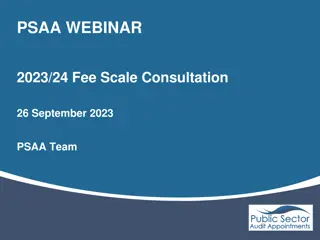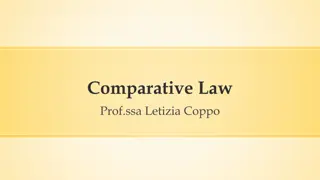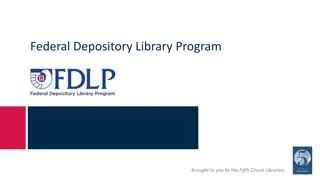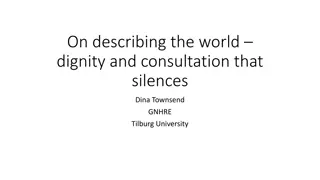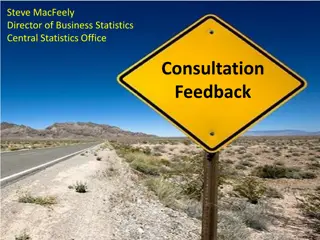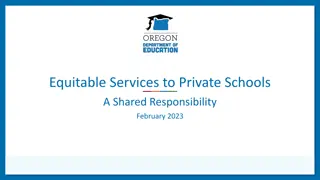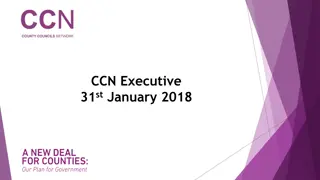
Federal Programs Consultation and Funding Opportunities for School Improvement
Explore Federal Programs Consultation and Funding Opportunities for the 2024-2025 school year, including support for economically disadvantaged students, effective instruction, English learners, and more. Enhance academic achievement, engage families, and improve outcomes through targeted assistance, professional development, technology integration, and collaborative services.
Download Presentation

Please find below an Image/Link to download the presentation.
The content on the website is provided AS IS for your information and personal use only. It may not be sold, licensed, or shared on other websites without obtaining consent from the author. Download presentation by click this link. If you encounter any issues during the download, it is possible that the publisher has removed the file from their server.
E N D
Presentation Transcript
Federal Programs Consultation J. R. Flores Federal & State Programs Director
ESSA Title I, Part A-Improving the Academic Achievement of Economic Disadvantaged Supplemental Support for Students: Provides additional resources to help economically disadvantaged students meet challenging state academic standards. Targeted Assistance Programs: Supports eligible students through focused interventions, tutoring, or small-group instruction. Schoolwide Programs: Funds comprehensive plans to improve the entire educational program of high-poverty schools, benefiting all students. Professional Development: Provides training and resources for educators to enhance instructional strategies and address the unique needs of economically disadvantaged students. Parent and Family Engagement: Encourages meaningful involvement of parents and families in their children's education, including hosting workshops, providing resources, and creating family-school partnerships. Technology Integration: Supports the use of technology to improve instruction and student learning outcomes. Extended Learning Opportunities: Funds programs like after-school tutoring, summer school, and enrichment activities to increase learning time. Support for Migratory and Homeless Students: Ensures these students have equal access to educational services and resources, such as transportation and academic support. Assessment and Monitoring: Helps schools identify and address gaps in student achievement by supporting data collection, analysis, and evidence-based interventions. Coordination of Services: Facilitates collaboration with other federal, state, and local programs to maximize resources and improve outcomes for disadvantaged students.
ESSA Title II, Part A-Supporting Effective Instruction Areas of Focus Recruit, Support and Retain Effective Teachers and Principals Professional Development/Growth Other Activities: Educator Induction and Mentorship Programs Teacher Leadership School Principal Support Recruiting Qualified Individual from Other Fields Improving School Working Conditions Other Evidence-Based Activities
ESSA Title III, Part A ELA Language Instruction for English Learners (ELs): Provides high-quality, evidence-based instructional programs to help ELs attain English proficiency and meet challenging state academic standards. Support for Immigrant Students: Offers supplemental services, such as orientation programs, counseling, and language support, to help recently arrived immigrant students adjust and succeed. Professional Development for Educators: Funds training for teachers, principals, and school leaders to improve their ability to support ELs through effective instructional strategies and cultural competency. Parent, Family, and Community Engagement: Encourages partnerships with families of ELs by providing resources, workshops, and translation/interpretation services to enhance involvement in their children s education. Program Development and Expansion: Supports the development, implementation, and scaling of innovative programs, such as dual-language immersion and transitional bilingual education. Instructional Materials and Resources: Provides funding for supplemental resources, including digital tools, textbooks, and software, specifically designed for EL instruction. Monitoring and Assessment of EL Progress: Ensures the use of valid and reliable assessments to track ELs' progress in acquiring English proficiency and academic achievement. Support for Long-Term ELs: Targets resources and interventions to assist ELs who have been in the program for an extended period without meeting proficiency standards. Collaboration with Federal, State, and Local Programs: Promotes coordination among agencies and programs to maximize resources and services for ELs and immigrant students. Addressing Academic Gaps: Implements strategies and interventions to close achievement gaps between ELs and their English- proficient peers.
ESSA Title III, Part A Immigrant Newcomer Programs: Develops and supports specialized programs to help newly arrived immigrant students transition into the U.S. school system. Language Support Services: Provides supplemental instruction to help immigrant students improve their English language proficiency and academic skills. Parent and Family Engagement: Offers workshops, resources, and translation/interpretation services to help families of immigrant students engage in their children s education and understand the U.S. school system. Cultural Adjustment Support: Funds initiatives to assist immigrant students and families in adapting to a new cultural and educational environment. Professional Development: Provides training for educators and staff on strategies to effectively teach and support immigrant students, including cultural responsiveness. Supplemental Academic Services: Supports tutoring, mentoring, and after-school programs to address the academic needs of immigrant students. Community Partnerships: Promotes collaboration with community organizations to offer additional support services, such as mental health counseling and legal assistance. Technology Integration: Funds technology and digital resources tailored to the needs of immigrant students to enhance language acquisition and learning. Orientation Programs: Creates programs to help immigrant students and their families understand school policies, academic expectations, and available resources. Data Collection and Program Evaluation: Ensures proper tracking of immigrant student progress and the effectiveness of funded programs.
ESSA Title IV, Part A-SSAEP Well-Rounded Education: Funds programs that enhance access to arts, music, STEM, civics, Advanced Placement (AP), International Baccalaureate (IB), and other subjects to provide students with a holistic education. Safe and Healthy Students: Supports initiatives that promote student physical and mental health, including drug and violence prevention programs, mental health services, and bullying prevention. Funds activities like physical education, nutrition education, and programs to support student wellness. Effective Use of Technology: Enhances technology integration in classrooms to improve student achievement and digital literacy. Provides training for educators to effectively use technology in teaching and learning. Limits funding for hardware to ensure focus on instructional technology and professional development. Support for Disadvantaged Students: Targets resources to schools with high percentages of economically disadvantaged students to ensure equitable access to academic enrichment programs. College and Career Readiness: Funds programs that prepare students for post-secondary education and careers, such as career counseling, dual enrollment, and work-based learning opportunities. Professional Development: Provides training for educators, counselors, and administrators to support effective implementation of enrichment and safety programs. Community and Family Engagement: Encourages partnerships with families and community organizations to support student academic and personal development. School Climate Improvements: Funds activities aimed at creating a positive and inclusive school environment, including restorative practices and social-emotional learning programs. Equity and Access: Ensures all students, particularly those in underserved or rural areas, have access to advanced coursework, extracurricular activities, and enrichment opportunities.
Your comments matters Please complete the comments form for ESSA Title I, Part A, Title II, Part A, Title III, Part A and Title IV, Part A https://bit.ly/ConsultationComment For more information and/or concerns contact: J. R. Flores, Federal & State Programs Director 956-323-2660 j.flores8@lajoyaisd.net





